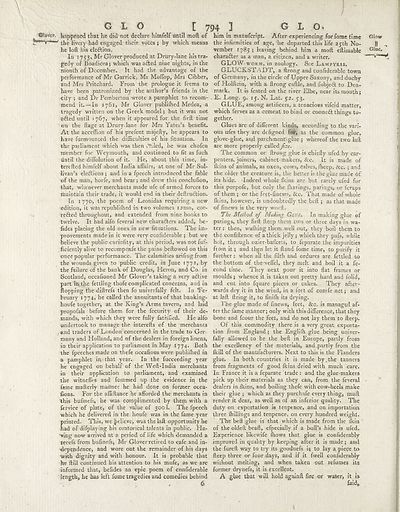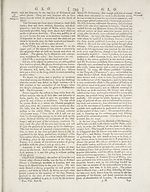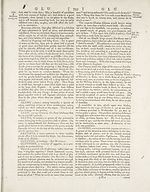Encyclopaedia Britannica > Volume 7, ETM-GOA
(872) Page 794
Download files
Complete book:
Individual page:
Thumbnail gallery: Grid view | List view

G L O [ 794 ] G L O«
Glover, happened that he did not declare himfelf until moft of
Tl' » " the livery had engaged their votes ; by which means
he loft his eleftion.
In 1753* Mr Glover produced at Drury-lane his tra¬
gedy of Boadicea; which was adted nine nights, in the
month of December. It had the advantage of the
performance of Mr Garrick, Mr Moflbp, Mrs Cibber,
and Mrs Pritchard. From the prologue it feems to
have been patronized by the author’s friends in the
city ; and Dr Pemberton wrote a pamphlet to recom¬
mend it.—In 1761, Mr Glover publilhed Medea, a
tragedy written on the Greek model; but it was not
afied until 1 767, when it appeared for the firft time
on the ftage at Drury-lane for Mrs Yates’s benefit.
At the acceffion of his prefent majefty, he appears to
have furmounted the difficulties of his fituation. In
the parliament which was then I’t-led, he was chofen
member for Weymouth, and continued to fit as fuch
Until the diffolution of it. He, about this time, in-
tertfted himfelf about India affairs, at one of Mr Sul¬
livan’s ele&ions; and in a fpeech introduced the fable
of the man, horfe, and bear; and drew this conclufion,
that, whenever merchants made ufe of armed forces to
maintain their trade, it would end in their deftruftion.
In 1770, the poem of Leonidas requiring a new
edition, it was republifhed in two volumes iz.mo, cor-
refted throughout, and extended from nine books to
twelve. It had alfo feveral new charafters added, be-
fides placing the old ones in new fituations. The im¬
provements made in it were very confiderable ; but we
believe the public ctiriofity, at this period, was not fuf-
frciently alive to recompenfe the pains beftowed on this
once popular performance. The calamities arifing from
the wounds given to public credit, in June 1772, by
the failure of the bank of Douglas, Heron, and Co. in
Scotland, occafioned Mr Glover’s taking a very a&ive
art iir the fettling thofe complicated concerns, and in
opping the diftrefs then fo univerfally felt. In Fe¬
bruary 1774, he called the annuitants of that banking-
houfe together, at the King’s Arms tavern, and laid
propofals before them for the fecurity of their de¬
mands, with which they were fully fatisxied. He alfo
undertook to manage the interefts of the merchants
and traders of London concerned in the trade to Ger
many and Holland, and of the dealers in foreign linens,
in their application to parliament in May 1774. Both
the fpeeches made on thefe occafious were publi/hed in
a pamphlet in that year. In the fucceeding year
he engaged on behalf of the Weft-India merchants
in their application to parliament, and examined
the witneffes and fummed up the evidence in the
fame mafterly mariner he had done on former occa-
fions. For the afliftance he afforded the merchants in
this bufinefs, he was complimented by them with a
fervice of plate, of the value of 3001. The fpeech
which he delivered in the houfe was in the fame year
printed. This, we Relieve, was the laft opportunity he
had of difplaying his oratorical talents in public. Ha¬
ving now arrived at a period of life which demanded a
jecefs from bufinefs, Mr Glover retired to eafe and in-
•dependence, and wore out the remainder of his days
with dignity and with honour. It is probable that
he ftill continued his attention to his mufe, as we are
informed that, befides an epic poem of confiderable
length, he has left feme tragedies and comedies behind
him in manufeript. After experiencing for fome time Glow
the infirmities of age, he departed this life 25th No- [}
vember 2785; leaving behind him a moft eftimable Giuc»
chara&er as a man, a citizen, and a writer. *
GLOW worm, in zoology. See Lamptris.
GLUCKSTADT, a ftrong and confiderable town
of Germany, in the circle of Upper Saxony, and duchy
of Holfteiu, with a ftrong caftle, and fubjeft to Den¬
mark. It is feated on the river Elbe, near its mouth;
. E. Long. 9. 15. N. Lat. 52. 53.
GLUE, among artificers, a tenacious vifeid matter,
which ferves as a cement to bind or connett things to¬
gether.
Glues are of different kinds, according to the vari¬
ous ufes they are defigned fo*, as the common glue,
glove-glue, and parchment-glue ; whereof the two laft
are more properly called Jizc.
The common or ftroag glue is chiefly ufed by car¬
penters, joiners, cabinet-makers, &c. It is made of
Ikins of animals, as oxen, cows, calves, fheep, &c. ; and
the older the creature is, the better is the glue made of
its hide. Indeed whole Ikins are but rarely ufed for
this purpofe, but only the fliavings, parings, or feraps
of them ; or the feet-finews, &c. That made of whole
/kins, however, is undoubtedly the heft ; as that made
of finews is the very word.
The Method of Making Glue. In making glue ©f
parings, they firft fteep them two or three days in wa¬
ter : then, waffling them well out, they boil them to
the confiftence of a thick jelly; which they pafs, while
hot, through ozier-balkets, to feparate the impurities
from it; and then let it (land fome time, to purify it
further: when all the filth and ordures are fettled to
the bottom of the-veffel, they melt and boil it a fe-
cond time. They next pour it into flat frames or
moulds; whence it is taken out pretty hard and folid,
and cut into fquare pieces or cakes. They after¬
wards dry it in the wind, in a fort of coarfe net; and
at laft ftring it, to finifti its drying.
The glue made of finews, feet, &c. is managed af¬
ter the fame manner; only with this difference, that they
bone and fcour the feet, and do not lay them to fteep.
Of this commodity there is a very great exporta¬
tion from England; the Englifh glue being univer¬
fally allowed to be the beft in Europe, partly from
the excellency of the materials, and partly from the
fltill of the manufafturers. Next to this is the Flanders
glue. In both countries it is made by.the tanners
from fragments of good Ikins dried with much care.
In France it is a feparate trade : and the glue-makers
pick up their materials as they can, from the feveral
dealers in Ikins, and boiling thefe with cow-heels make
their glue ; which as they purchafe every thing, muft
render it dear, as well as of an inferior quality. The
duty on exportation is tenpence, and on importation
three {hillings and tenpence, on every hundred weight.
The beft glue is that which is made from the {kin
of the oldeft beaft, efpecially if a bull’s hide is ufed.
Experience likewife fhows that glue is confiderably
improved in quality by keeping after it is made; and
the fureft way to try its goodnefs is to lay a piece to
fteep three or four days, and if it fwell confiderably
without melting, and when taken out refumes its
former drynefs, it is excellent.
A glue that will hold againft fire or water, it is
laid*
Glover, happened that he did not declare himfelf until moft of
Tl' » " the livery had engaged their votes ; by which means
he loft his eleftion.
In 1753* Mr Glover produced at Drury-lane his tra¬
gedy of Boadicea; which was adted nine nights, in the
month of December. It had the advantage of the
performance of Mr Garrick, Mr Moflbp, Mrs Cibber,
and Mrs Pritchard. From the prologue it feems to
have been patronized by the author’s friends in the
city ; and Dr Pemberton wrote a pamphlet to recom¬
mend it.—In 1761, Mr Glover publilhed Medea, a
tragedy written on the Greek model; but it was not
afied until 1 767, when it appeared for the firft time
on the ftage at Drury-lane for Mrs Yates’s benefit.
At the acceffion of his prefent majefty, he appears to
have furmounted the difficulties of his fituation. In
the parliament which was then I’t-led, he was chofen
member for Weymouth, and continued to fit as fuch
Until the diffolution of it. He, about this time, in-
tertfted himfelf about India affairs, at one of Mr Sul¬
livan’s ele&ions; and in a fpeech introduced the fable
of the man, horfe, and bear; and drew this conclufion,
that, whenever merchants made ufe of armed forces to
maintain their trade, it would end in their deftruftion.
In 1770, the poem of Leonidas requiring a new
edition, it was republifhed in two volumes iz.mo, cor-
refted throughout, and extended from nine books to
twelve. It had alfo feveral new charafters added, be-
fides placing the old ones in new fituations. The im¬
provements made in it were very confiderable ; but we
believe the public ctiriofity, at this period, was not fuf-
frciently alive to recompenfe the pains beftowed on this
once popular performance. The calamities arifing from
the wounds given to public credit, in June 1772, by
the failure of the bank of Douglas, Heron, and Co. in
Scotland, occafioned Mr Glover’s taking a very a&ive
art iir the fettling thofe complicated concerns, and in
opping the diftrefs then fo univerfally felt. In Fe¬
bruary 1774, he called the annuitants of that banking-
houfe together, at the King’s Arms tavern, and laid
propofals before them for the fecurity of their de¬
mands, with which they were fully fatisxied. He alfo
undertook to manage the interefts of the merchants
and traders of London concerned in the trade to Ger
many and Holland, and of the dealers in foreign linens,
in their application to parliament in May 1774. Both
the fpeeches made on thefe occafious were publi/hed in
a pamphlet in that year. In the fucceeding year
he engaged on behalf of the Weft-India merchants
in their application to parliament, and examined
the witneffes and fummed up the evidence in the
fame mafterly mariner he had done on former occa-
fions. For the afliftance he afforded the merchants in
this bufinefs, he was complimented by them with a
fervice of plate, of the value of 3001. The fpeech
which he delivered in the houfe was in the fame year
printed. This, we Relieve, was the laft opportunity he
had of difplaying his oratorical talents in public. Ha¬
ving now arrived at a period of life which demanded a
jecefs from bufinefs, Mr Glover retired to eafe and in-
•dependence, and wore out the remainder of his days
with dignity and with honour. It is probable that
he ftill continued his attention to his mufe, as we are
informed that, befides an epic poem of confiderable
length, he has left feme tragedies and comedies behind
him in manufeript. After experiencing for fome time Glow
the infirmities of age, he departed this life 25th No- [}
vember 2785; leaving behind him a moft eftimable Giuc»
chara&er as a man, a citizen, and a writer. *
GLOW worm, in zoology. See Lamptris.
GLUCKSTADT, a ftrong and confiderable town
of Germany, in the circle of Upper Saxony, and duchy
of Holfteiu, with a ftrong caftle, and fubjeft to Den¬
mark. It is feated on the river Elbe, near its mouth;
. E. Long. 9. 15. N. Lat. 52. 53.
GLUE, among artificers, a tenacious vifeid matter,
which ferves as a cement to bind or connett things to¬
gether.
Glues are of different kinds, according to the vari¬
ous ufes they are defigned fo*, as the common glue,
glove-glue, and parchment-glue ; whereof the two laft
are more properly called Jizc.
The common or ftroag glue is chiefly ufed by car¬
penters, joiners, cabinet-makers, &c. It is made of
Ikins of animals, as oxen, cows, calves, fheep, &c. ; and
the older the creature is, the better is the glue made of
its hide. Indeed whole Ikins are but rarely ufed for
this purpofe, but only the fliavings, parings, or feraps
of them ; or the feet-finews, &c. That made of whole
/kins, however, is undoubtedly the heft ; as that made
of finews is the very word.
The Method of Making Glue. In making glue ©f
parings, they firft fteep them two or three days in wa¬
ter : then, waffling them well out, they boil them to
the confiftence of a thick jelly; which they pafs, while
hot, through ozier-balkets, to feparate the impurities
from it; and then let it (land fome time, to purify it
further: when all the filth and ordures are fettled to
the bottom of the-veffel, they melt and boil it a fe-
cond time. They next pour it into flat frames or
moulds; whence it is taken out pretty hard and folid,
and cut into fquare pieces or cakes. They after¬
wards dry it in the wind, in a fort of coarfe net; and
at laft ftring it, to finifti its drying.
The glue made of finews, feet, &c. is managed af¬
ter the fame manner; only with this difference, that they
bone and fcour the feet, and do not lay them to fteep.
Of this commodity there is a very great exporta¬
tion from England; the Englifh glue being univer¬
fally allowed to be the beft in Europe, partly from
the excellency of the materials, and partly from the
fltill of the manufafturers. Next to this is the Flanders
glue. In both countries it is made by.the tanners
from fragments of good Ikins dried with much care.
In France it is a feparate trade : and the glue-makers
pick up their materials as they can, from the feveral
dealers in Ikins, and boiling thefe with cow-heels make
their glue ; which as they purchafe every thing, muft
render it dear, as well as of an inferior quality. The
duty on exportation is tenpence, and on importation
three {hillings and tenpence, on every hundred weight.
The beft glue is that which is made from the {kin
of the oldeft beaft, efpecially if a bull’s hide is ufed.
Experience likewife fhows that glue is confiderably
improved in quality by keeping after it is made; and
the fureft way to try its goodnefs is to lay a piece to
fteep three or four days, and if it fwell confiderably
without melting, and when taken out refumes its
former drynefs, it is excellent.
A glue that will hold againft fire or water, it is
laid*
Set display mode to:
![]() Universal Viewer |
Universal Viewer | ![]() Mirador |
Large image | Transcription
Mirador |
Large image | Transcription
Images and transcriptions on this page, including medium image downloads, may be used under the Creative Commons Attribution 4.0 International Licence unless otherwise stated. ![]()
| Encyclopaedia Britannica > Encyclopaedia Britannica > Volume 7, ETM-GOA > (872) Page 794 |
|---|
| Permanent URL | https://digital.nls.uk/189132565 |
|---|
| Attribution and copyright: |
|
|---|
| Description | Ten editions of 'Encyclopaedia Britannica', issued from 1768-1903, in 231 volumes. Originally issued in 100 weekly parts (3 volumes) between 1768 and 1771 by publishers: Colin Macfarquhar and Andrew Bell (Edinburgh); editor: William Smellie: engraver: Andrew Bell. Expanded editions in the 19th century featured more volumes and contributions from leading experts in their fields. Managed and published in Edinburgh up to the 9th edition (25 volumes, from 1875-1889); the 10th edition (1902-1903) re-issued the 9th edition, with 11 supplementary volumes. |
|---|---|
| Additional NLS resources: |
|

